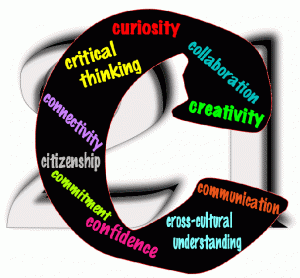Reflecting is a critical part of learning because that’s when our brains accommodate, assimilate and adapt new information so it fits comfortably with what we already know, do understand, appreciate and value, New connections are made between existing dendrites, those “magic trees of the mind“, and new ones grown if the brain considers the new information important enough to remember, enabling the new learning and understanding to be transferred and applied to new situations.
While my model of the Information Literacy Process includes the element of reflection and some broad scaffolding questions, encouraging students to think more deeply and critically encourages them to analyse and interpret the new information and its sources and make a more informed assessment of its value.
Critical thinking has been identified as one of the common core of 21st century skills that our students will need to be able to operate in the work environment they will encounter and is considered as essential as literacy and numeracy in the Australian Curriculum leading to a focus on inquiry learning that underpins the teacher librarian’s specialist subject.

The Australian Curriculum identifies critical and creative thinking as being able to
- pose questions
- identify and clarify information and ideas
- organise and process information
- imagine possibilities and connect ideas
- consider alternatives
- seek solutions and put ideas into action.
- think about thinking (metacognition)
- reflect on processes
- transfer knowledge into new contexts.
- apply logic and reasoning
- draw conclusions and design a course of action
- evaluate procedures and outcomes.
However, students need to see demonstrations of what these mean in practice and so modelling the sorts of questions they need to ask themselves provides the external structure for the internal scaffold that eventually develops.
Adapted from a diagram from the Global Digital Citizen Foundation (which also offers a number of relevant articles and resources) the following may offer some starting points…
 |
Who is responsible for this information/decision? Who are the key drivers of this? Who is most directly affected by this? Who gains most from this? Who does this ignore, harm or disadvantage? |
Who else is talking about this? Who is not talking about it? Why? Who would know more about this? Who else needs to be consulted so all voices are heard? Who deserves recognition for this?
|
 |
What are the strengths/weaknesses? What is another perspective? What is another alternative? What would be a counter-argument? What could be a better strategy for a similar result? |
What could happen as a result of this? What are the best./worst case scenarios? What are the most important elements? What needs to be done to implement this? What are the impediments to its implementation? |
 |
Where could this happen in reality? Where would it pose issues or be a problem? Where are there similar situations/concepts/programs? Where would benefit most from this?
|
Where can we get more information? Where can we go for more clarity or assistance? Where will this take us? Where are the areas for improvement? |
 |
When is this acceptable/unacceptable? When would be the best time to act? When would it be of most benefit? When would it cause a problem? |
When will we know it has been successful? When has this played a part in history? When will there be measurable, noticeable change? When should we seek additional assistance? |
 |
Why is this important? Why is it a solution/problem/challenge? Why is this the best/worst scenario? Why are people influenced/affected by this? |
Why should people know about this? Why has tis situation been allowed to develop? Why has this not changed even though it has been a problem? Why is there a need for change now? |
 |
How is this similar to ____________? How does it confirm/challenge or change the status quo? How do we know the truth about this? How can we approach this to ensure success? |
How does this benefit us/others? How does this harm us/others? How will this change the future? How can we change this for the common good? |
